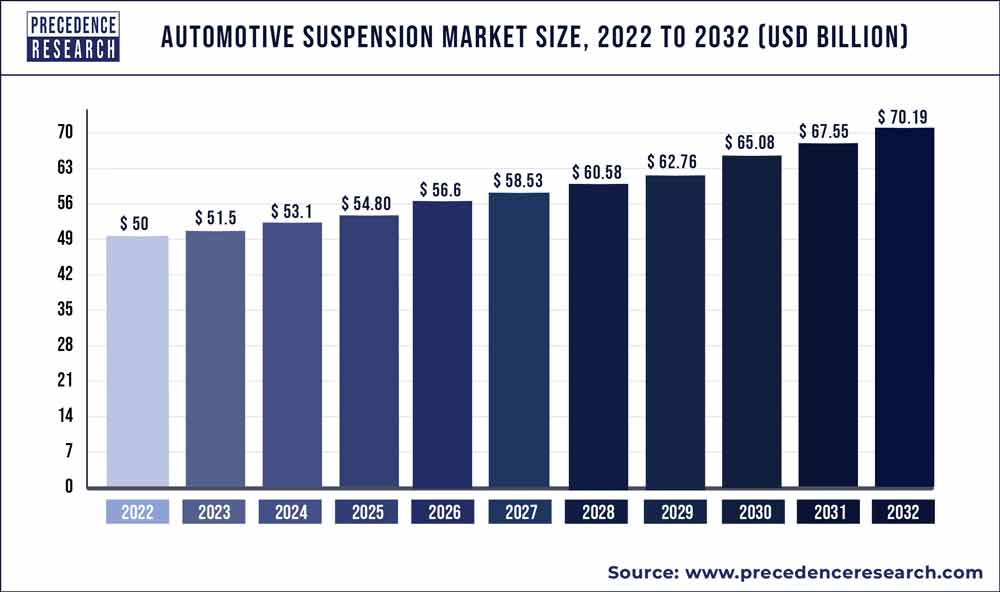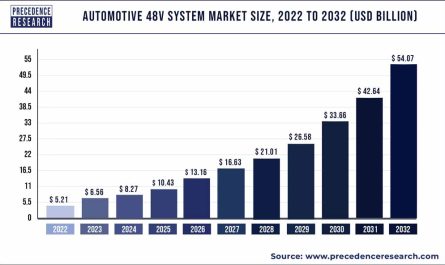The global automotive suspension market was worth US$ 50 billion in 2022 and is projected to reach over US$ 70.19 billion by 2032 with a CAGR of 3.5% from 2023 to 2032.

The automotive suspension market plays a critical role in ensuring vehicle stability, handling, and ride comfort by absorbing shocks and vibrations from the road surface. It encompasses various components and systems designed to support the vehicle’s weight, maintain tire contact with the road, and minimize body roll during cornering. As the automotive industry continues to evolve, driven by technological advancements, changing consumer preferences, and regulatory requirements, the demand for advanced suspension systems is expected to grow significantly. This overview delves into the key factors driving the growth of the automotive suspension market, regional insights, drivers, opportunities, and challenges shaping its trajectory.
Get a Sample: https://www.precedenceresearch.com/sample/1482
Growth Factors:
Several factors contribute to the growth of the automotive suspension market. Firstly, the increasing demand for vehicles with enhanced safety, comfort, and performance attributes drives the adoption of advanced suspension technologies. Manufacturers are continuously innovating to develop suspension systems that offer superior ride quality, improved handling, and reduced noise, vibration, and harshness (NVH) levels.
Moreover, stringent government regulations and safety standards aimed at reducing emissions and enhancing vehicle efficiency have prompted automakers to invest in lightweight suspension components and systems. Lightweight materials such as aluminum, magnesium, and composite materials are being increasingly used to reduce the overall weight of vehicles, improve fuel efficiency, and minimize environmental impact.
Furthermore, the proliferation of electric and hybrid vehicles presents new opportunities for innovation in automotive suspension design. Electric vehicles (EVs) require sophisticated suspension systems capable of managing the unique characteristics of electric powertrains, such as instant torque delivery and regenerative braking. Additionally, the shift towards autonomous driving technologies necessitates advanced suspension systems capable of providing stability and control in diverse driving conditions.
Additionally, the growing trend towards vehicle electrification and connectivity is driving demand for adaptive suspension systems that can dynamically adjust damping and stiffness levels based on driving conditions and driver preferences. Adaptive suspension technologies offer a customizable driving experience, allowing drivers to switch between comfort and sport modes to suit their preferences.
Region Insights:
The adoption of automotive suspension technologies varies across regions, influenced by factors such as vehicle preferences, road conditions, regulatory requirements, and economic factors. In mature automotive markets such as North America and Europe, demand for advanced suspension systems is driven by a strong emphasis on vehicle safety, comfort, and performance. European automakers, in particular, are known for their focus on engineering precision and driving dynamics, leading to the widespread adoption of advanced suspension technologies.
In emerging markets such as Asia Pacific and Latin America, the automotive suspension market is propelled by rapid urbanization, rising disposable incomes, and increasing demand for passenger vehicles. Countries like China and India are witnessing a surge in vehicle ownership, driving demand for affordable yet reliable suspension solutions tailored to local road conditions and consumer preferences.
In the Middle East and Africa, the automotive suspension market is characterized by a mix of traditional and modern suspension technologies, with an emphasis on durability, reliability, and off-road performance. With vast expanses of desert terrain and challenging road conditions, vehicles in this region require robust suspension systems capable of handling rough terrain and extreme temperatures.
Automotive Suspension Market Scope
| Report Coverage | Details |
| Market Size in 2023 | USD 51.5 Billion |
| Market Size by 2032 | USD 70.19 Billion |
| Growth Rate from 2023 to 2032 | 3.5% |
| Largest Market | Asia Pacific |
| Fastest Growing Market | Europe |
| Base Year | 2022 |
| Forecast Period | 2023 to 2032 |
| Segments Covered | System Type, Region |
Drivers:
Several drivers are shaping the growth of the automotive suspension market. Firstly, the growing demand for comfort and safety features in vehicles is driving the adoption of advanced suspension technologies. Consumers are increasingly prioritizing ride quality, cabin comfort, and noise insulation, leading automakers to invest in suspension systems that deliver a smoother, quieter, and more refined driving experience.
Moreover, regulatory mandates aimed at improving vehicle safety and reducing emissions are driving the adoption of lightweight suspension components and systems. Lightweight materials such as aluminum, carbon fiber, and high-strength steel are being increasingly utilized to reduce vehicle weight and enhance fuel efficiency without compromising structural integrity or performance.
Furthermore, technological advancements in suspension design, including active and semi-active damping systems, air suspension systems, and electronic control units (ECUs), are expanding the capabilities of automotive suspension systems. These advanced technologies offer greater flexibility, responsiveness, and adaptability, enabling vehicles to adjust suspension settings in real-time to optimize ride comfort, handling, and stability.
Additionally, the increasing trend towards vehicle electrification and autonomous driving is spurring demand for advanced suspension systems capable of supporting electric powertrains and providing stability and control in autonomous driving modes. Electric vehicles (EVs) require suspension systems optimized for the unique characteristics of electric propulsion, such as instant torque delivery and regenerative braking, while autonomous vehicles require adaptive suspension systems capable of adjusting damping and stiffness levels to ensure a smooth and stable ride.
Opportunities:
The automotive suspension market presents numerous opportunities for manufacturers, suppliers, and technology providers. Firstly, the growing demand for electric and hybrid vehicles creates opportunities for innovation in suspension design and development. Electric vehicles require lightweight suspension components capable of supporting the unique characteristics of electric powertrains, while hybrid vehicles benefit from regenerative braking systems that can capture and store energy during deceleration.
Moreover, the increasing trend towards vehicle connectivity and autonomy opens up opportunities for advanced suspension technologies capable of integrating with onboard sensors, cameras, and control systems. Adaptive suspension systems equipped with sensors and actuators can dynamically adjust damping and stiffness levels based on real-time data, enhancing vehicle stability, comfort, and performance.
Furthermore, the aftermarket segment of the automotive suspension market presents lucrative opportunities for suppliers and service providers. With an increasing number of vehicle owners looking to upgrade their suspension systems for improved performance or customization, there is a growing demand for aftermarket suspension components, kits, and accessories.
Additionally, partnerships and collaborations between automakers, suppliers, and technology providers can drive innovation and accelerate the development of next-generation suspension technologies. By leveraging collective expertise, resources, and capabilities, stakeholders can address emerging challenges, explore new opportunities, and deliver innovative solutions that enhance vehicle dynamics, safety, and comfort.
Challenges:
Despite the growth prospects, the automotive suspension market faces several challenges that must be addressed to realize its full potential. Firstly, the high cost of advanced suspension technologies, including active and semi-active damping systems, air suspension systems, and electronic control units (ECUs), poses a barrier to widespread adoption, particularly in price-sensitive market segments.
Moreover, the complexity of modern suspension systems, coupled with the need for specialized tools, equipment, and expertise for installation and maintenance, presents challenges for aftermarket suppliers and service providers. As vehicles become increasingly sophisticated and technologically advanced, aftermarket stakeholders must invest in training and infrastructure to meet evolving customer needs and expectations.
Furthermore, regulatory compliance and safety standards pose challenges for suspension manufacturers and suppliers, requiring rigorous testing, validation, and certification of suspension components and systems to ensure compliance with applicable regulations and industry standards.
Additionally, the rapid pace of technological change and innovation in the automotive industry presents challenges in terms of product lifecycle management, obsolescence management, and technology integration. Manufacturers and suppliers must continuously invest in research and development (R&D) to stay ahead of the curve, anticipate market trends, and develop innovative solutions that meet evolving customer requirements and regulatory mandates.
Read Also: Automotive Wheel Market Size to Reach US$ 78.10 Bn by 2032
Automotive Suspension Market Companies
- Tenneco Inc.
- Continental AG
- ZF Friedrichschafen AG
- Schaeffler AG
- Sogefi SpA
- Magneti Marelli SpA
- KYB Corporation
- ThyssenKrupp AG
- Mondo Corporation
- BENTELER International AG
Segments Covered in the Report
By Suspension Type
- Macpherson Strut
- Multilink Suspension
- Air Suspension
By System Type
- Passive Suspension
- Semi Active Suspension
- Active Suspension
By Actuation Type
- Hydraulically Actuated Suspension
- Electronically Actuated Suspension
By Vehicle Type
- Passenger Vehicle
- Light Commercial Vehicle
By Geography
- North America
- U.S.
- Canada
- Europe
- U.K.
- Germany
- France
- Asia-Pacific
- China
- India
- Japan
- South Korea
- Latin America
- MEA
- Rest of the World
Contact Us:
Mr. Alex
Sales Manager
Call: +1 9197 992 333
Email: sales@precedenceresearch.com
Web: https://www.precedenceresearch.com
Blog: https://www.expresswebwire.com/

